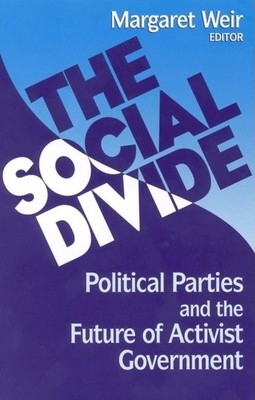
- We will send in 10–14 business days.
- Publisher: Brookings Institution Press
- ISBN-10: 0815792875
- ISBN-13: 9780815792871
- Format: 15.2 x 22.8 x 3.7 cm, minkšti viršeliai
- Language: English
- SAVE -10% with code: EXTRA
The Social Divide (e-book) (used book) | bookbook.eu
Reviews
Description
"
The extraordinary swings in the scope and content of the policy agenda during the first Clinton administration revealed a fundamental partisan divide over the social role of the federal government. This book argues that the recent conflicts over social policy represent key elements in strategies that parties designed in an attempt to consolidate their hold over the federal government. Long frustrated by divided government, each party exceeded its electoral mandate in hopes of enacting major policy reforms aimed to shift politics in their direction for the foreseeable future.
The book traces the overreaching and limited legislative success that characterized the first Clinton administration's approach to three distinctive features of politics and policymaking: the polarization of political elites; the predominance of advertising campaigns and intense interest group politics as political parties have ceased to mobilize ordinary people; and the unprecedented role that budgetary concerns now play in social policymaking. Although neither party managed to enact its major transforming agenda, Congress did pass new policies--most notably welfare reform--that together with a host of other changes in the states and the private sector altered the landscape for social policy. The poor have been the biggest losers as Democrats and Republicans have fought to win the middle class over to their vision of the future.
The authors first analyze the institutions and tools of policymaking, including Congress, the political use of public opinion polling, and the politics of the deficit. They then consider policies designed to win over the middle class, including health care policy, employer-provided social benefits, wages and jobs, and crime policy. Last, they address policies targeted at the disadvantaged, including welfare, affirmative action, and urban policy.
In addition to the editor, the contributors include John Ferejohn, Lawrence R. Jacobs, Robert Y. Shapiro, Paul Pierson, Mark A. Peterson, Cathie Jo Martin, Ann Lin, R. Kent Weaver, Linda Williams, and John Mollenkopf.
Copublished with the Russell Sage Foundation
"EXTRA 10 % discount with code: EXTRA
The promotion ends in 22d.15:19:29
The discount code is valid when purchasing from 10 €. Discounts do not stack.
- Publisher: Brookings Institution Press
- ISBN-10: 0815792875
- ISBN-13: 9780815792871
- Format: 15.2 x 22.8 x 3.7 cm, minkšti viršeliai
- Language: English English
"
The extraordinary swings in the scope and content of the policy agenda during the first Clinton administration revealed a fundamental partisan divide over the social role of the federal government. This book argues that the recent conflicts over social policy represent key elements in strategies that parties designed in an attempt to consolidate their hold over the federal government. Long frustrated by divided government, each party exceeded its electoral mandate in hopes of enacting major policy reforms aimed to shift politics in their direction for the foreseeable future.
The book traces the overreaching and limited legislative success that characterized the first Clinton administration's approach to three distinctive features of politics and policymaking: the polarization of political elites; the predominance of advertising campaigns and intense interest group politics as political parties have ceased to mobilize ordinary people; and the unprecedented role that budgetary concerns now play in social policymaking. Although neither party managed to enact its major transforming agenda, Congress did pass new policies--most notably welfare reform--that together with a host of other changes in the states and the private sector altered the landscape for social policy. The poor have been the biggest losers as Democrats and Republicans have fought to win the middle class over to their vision of the future.
The authors first analyze the institutions and tools of policymaking, including Congress, the political use of public opinion polling, and the politics of the deficit. They then consider policies designed to win over the middle class, including health care policy, employer-provided social benefits, wages and jobs, and crime policy. Last, they address policies targeted at the disadvantaged, including welfare, affirmative action, and urban policy.
In addition to the editor, the contributors include John Ferejohn, Lawrence R. Jacobs, Robert Y. Shapiro, Paul Pierson, Mark A. Peterson, Cathie Jo Martin, Ann Lin, R. Kent Weaver, Linda Williams, and John Mollenkopf.
Copublished with the Russell Sage Foundation
"

Reviews